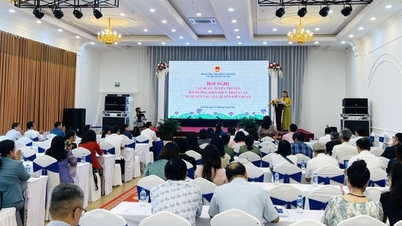
No additional burden on taxpayers
One of the focuses of the Draft Law on Personal Income Tax (replacement) is administrative procedure reform, with a clear orientation: simplicity, transparency, convenience and no additional burden for taxpayers.
The representative of the drafting agency, the Ministry of Finance, emphasized the need to comprehensively review procedures, reduce intermediaries, and promote the provision of online public services and the application of digital technology in tax management. This is in line with the trend of administrative reform and national digital transformation, helping to save time and compliance costs for people and businesses, while improving the effectiveness and efficiency of state management.
Along with the procedural reform is a stronger decentralization and delegation of power. The draft regulation stipulates that the Government is empowered to detail many important contents such as the family deduction level, the threshold of business revenue not subject to personal income tax, the scope of charitable and humanitarian contributions that can be deducted, other specific deductions as well as the insurance contribution level for voluntary pension funds. These are issues directly related to socio -economic fluctuations, requiring flexible mechanisms and timely adjustments instead of waiting for the lengthy law amendment process.
Not only the Government, the Ministry of Finance and a number of other ministries and branches are also given specific authority in guiding criteria related to experts, scientists , high-tech human resources, and subjects with special tax exemption and reduction policies. This decentralization creates initiative and flexibility in management, and is consistent with the spirit of decentralization and delegation that the Party and State are strongly implementing in institutional reform.
According to Mr. Truong Ba Tuan - Deputy Director of the Department of Management and Supervision of Tax, Fee and Charge Policies (Ministry of Finance), this draft law is built on the basis of a comprehensive assessment of current regulations. The revised content focuses on major groups of issues such as: Completing regulations on taxable income and tax calculation; reviewing and supplementing tax exemptions; amending regulations on tax declaration and deduction. One of the important contents is adjusting the progressive tax table, family deduction levels and adding special deductions.
The new highlight of the draft is the proposal to increase the family deduction for taxpayers from 11 million VND/month to 15.5 million VND/month and for each dependent from 4.4 million to 6.2 million VND/month. This is a content that has received a lot of consensus from National Assembly delegations, ministries, branches, localities and the general public.
According to analysts, this adjustment is consistent with the growth rate of GDP per capita and the average income of people from 2020 to now, which has increased by about 40-42%. More importantly, in the context of escalating living costs, especially in large cities, increasing family deductions will significantly reduce the tax burden on workers.
For example, with the new deduction, people with an income of 15 million VND/month after deducting insurance will not have to pay tax; people with an income of 20 million VND will only have to pay about 120,000 VND/month, instead of the much higher figure before. These changes are expected to both directly support life and create more room to stimulate consumption, thereby indirectly contributing to nurturing budget revenue through other indirect taxes.
In fact, the process of collecting public opinions showed that the option of increasing the deduction to 15.5 million VND received overwhelming support. The Ministry of Finance received dozens of comments, in which many delegations of National Assembly deputies such as Ca Mau, Nghe An, Quang Tri, Lai Chau, Tuyen Quang... unanimously chose this option, considering it a fair, reasonable and realistic solution.
Many opinions emphasize that this adjustment not only reduces tax obligations and increases disposable income for households, but also creates a positive spillover effect: stimulating consumption, growth, and indirectly enriching revenue from other consumption taxes.
Notably, real-life stories from workers further clarify the urgency of this adjustment. For example, Ms. Nguyen Thuy Duong, an employee at a public service unit in Hanoi, earns about 12 million VND/month but still has to pay taxes, while having to pay additional costs for rent, electricity, water, and living expenses, leaving "not much left over".
Or like Mr. Nguyen Minh Hoang, whose income is only 9.5 million VND/month, in principle not subject to tax, but every time he receives a bonus on holidays and Tet, tax is deducted because he has no dependents. For Ms. Le Thi Tuyet, raising a small child with a salary of 21 million VND/month, when an incident occurs such as the child being hospitalized, the additional expenses have caused the mother and child to "have negative money for months" even though they still have to pay taxes...
These examples show that the current tax policy is out of step with people's actual spending, and adjusting the family deduction to 15.5 million VND is a necessary step to ensure fairness and reasonableness. Not only that, adjusting the family deduction also shows that the tax policy has shifted from the mindset of "adjusting when the CPI fluctuates by more than 20%" to a more flexible approach, linked to the reality of people's lives and income levels.
This is a step forward in policy making, overcoming the situation of “being behind life” that has caused public outrage. With the new regulation, taxpayers’ rights are better guaranteed, while policies become more accessible, more acceptable, and create social consensus, moving towards a fair, transparent, and synchronous tax system, meeting the practical requirements of socio-economic development and institutionalizing major policies of the Party and State.
Simplifying the progressive tax schedule and its practical impact
While procedural reform and the expansion of family deductions directly benefit taxpayers, the reduction of the progressive tax schedule from seven to five levels has both technical and strategic significance. One of the most concerning issues is the family deduction policy. Deputy Minister of Finance Cao Anh Tuan said that the cumulative consumer price index (CPI) since the most recent adjustment period has nearly reached the 20% threshold - the prescribed level to trigger the adjustment. Therefore, the Ministry of Finance has proactively submitted to the National Assembly Standing Committee an adjustment plan this year.
According to Deputy Minister Cao Anh Tuan, the Ministry of Finance is considering many options to increase the family deduction level, in which taking the national average level will be more beneficial for people in poor provinces and remote areas. However, the policy needs to ensure fairness and avoid sudden impacts on budget revenue.
Under current regulations, the tax schedule consists of 7 levels with tax rates ranging from 5% to 35%. However, many opinions say that this structure is complicated, easily creating a "stepping" situation and causing difficulties in declaration and settlement.
The representative of the drafting agency said that the Draft Law proposes two shortened options, both consisting of 5 levels, with the income gap between levels being widened, the minimum tax rate is still 5% and the maximum is kept at 35%.

Option 1 : prescribe a rate of 5% for taxable income up to 10 million VND, 15% for 10-30 million, 20% for 30-50 million, 30% for 50-80 million and 35% for over 80 million VND.
Option 2: keep the first two levels but adjust the next levels to 25% for 30-60 million, 30% for 60-100 million and 35% for over 100 million VND. The difference is that option 2 brings greater benefits to the group of taxpayers with high incomes of over 50 million VND/month, which means the state budget will lose more revenue.
According to calculations, option 2 could reduce the budget revenue by about 21 trillion VND, while option 1 would reduce about 12 trillion VND. However, the positive impact is that taxpayers will have a significantly reduced burden, thereby stimulating consumption and promoting the labor market.
In fact, the survey of people's living standards in 2024 shows that the average income per capita will reach 5.4 million VND/month, while the richest 20% of the population will only reach an average of 11.8 million VND/month. With the proposal to increase the family deduction to 15.5 million VND/month, many people with low-middle income will no longer be subject to taxation. This reflects a fundamental change in policy: prioritizing the protection of low- and middle-income groups, while regulating more strongly the high-income group. The new policy also contributes to reducing "compliance costs" for people, when the number of tax brackets is fewer, easier to understand, easier to predict, helping taxpayers proactively declare honestly instead of trying to avoid.
It is important that the reduction of tax brackets and increase of family deductions are implemented in the context of increasing living costs, especially for the labor group in large urban areas. Many opinions of National Assembly deputies and people believe that the current deduction levels are outdated and no longer suitable for current prices. Therefore, this adjustment not only partially relieves the financial burden on taxpayers but also creates social consensus, increases the fairness and reasonableness of tax policy.
In the long term, tax reform and family deductions are also linked to the strategy of reforming the tax system until 2030. This is a step to ensure that tax policies are consistent with living standards, incomes and international practices, while encouraging the development of the labor market in the context of integration. When taxpayers' rights are guaranteed, procedural burdens are reduced, trust in tax policies will be strengthened, thereby fostering sustainable revenue sources and creating a foundation for economic growth.
According to Deputy Minister Cao Anh Tuan, the Draft Law on Personal Income Tax (replacement) is not only an adjustment of tax rates or deductions, but also a change in policy approach. Reducing administrative procedures, flexibly decentralizing, expanding family deductions and shortening the progressive tax schedule are steps demonstrating the State's efforts in putting people and businesses at the center of reform. This is an important basis for the personal income tax policy to both ensure social equity and nurture budget revenue in the new development stage.
“The Ministry of Finance will continue to listen to opinions from businesses, associations, localities and experts to build fair and transparent policies, while contributing to economic stability and increasing budget revenue in a sustainable manner,” the Deputy Minister of Finance affirmed.
Source: https://nhandan.vn/bai-2-don-gian-hoa-thu-tuc-rut-gon-bieu-thue-mo-rong-giam-tru-gia-canh-post909642.html


![[Photo] Prime Minister Pham Minh Chinh chairs the first meeting of the Central Steering Committee on housing policy and real estate market](https://vphoto.vietnam.vn/thumb/1200x675/vietnam/resource/IMAGE/2025/9/22/c0f42b88c6284975b4bcfcf5b17656e7)





















![[Photo] Prime Minister Pham Minh Chinh chairs the first meeting of the Central Steering Committee on housing policy and real estate market](https://vphoto.vietnam.vn/thumb/402x226/vietnam/resource/IMAGE/2025/9/22/c0f42b88c6284975b4bcfcf5b17656e7)



![[Photo] General Secretary To Lam presents the First Class Labor Medal to the Vietnam National Energy and Industry Group](https://vphoto.vietnam.vn/thumb/1200x675/vietnam/resource/IMAGE/2025/9/21/0ad2d50e1c274a55a3736500c5f262e5)
































































Comment (0)